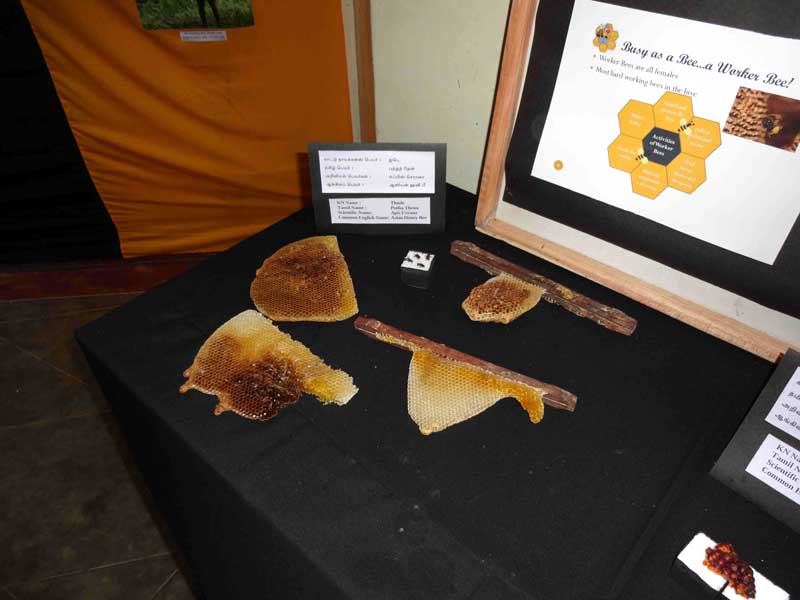
Honey and wax production is a major seasonal activity of bees in forest areas. Around 5000 locals earn their livelihood by gathering honey and bee-wax in the season from April to June. They are locally called as ‘Mahudharali’ (honey collector). […]
Around 5000 locals earn their livelihood by gathering honey and bee-wax in the season from April to June. They are locally called as ‘Mahudharali’ (honey collector).
“We used to eke out our living by collecting honey. But the Forest officials are not allowing us to collect honey for the last seven years. Sometimes, we grease the palms of the officials to collect honey from Bhitarkanika,” said Nrusingh Das, a honey collector of Dangamala village within the park.
“In Sundarban National Park of West Bengal, locals are allowed to collect honey from the mangrove forest. But in Bhitarkanika, it has been banned. As per the Scheduled Tribes and Other Traditional Forest Dwellers (Recognition of Forest Rights) Act-2006, forest dwellers have right to collect honey,” said Umesh Chandra Singh, president of district Krushaka Sabha.
Source: Odisha: Honey lure leads to Barunei forest fire, The New Indian Express, 17th April 2018
URL: https://www.newindianexpress.com/states/odisha/2018/apr/17/odisha-honey-lure-leads-to-barunei-forest-fire-1802545.html
Date visited: 27 January 2020
[Bold typeface added above for emphasis]
Tip
Find more information on this topic by typing “honey gathering” or similar word combinations in the search field below
Note: for official figures include “scheduled tribe ST” along with a union state or region, e.g. “Chhattisgarh ST community”, “Scheduled tribe Tamil Nadu census”, “ST Kerala census”, “Particularly Vulnerable Tribal Group Jharkhand”, “PVTG Rajasthan”, “Adivasi ST Kerala”, “Adibasi ST West Bengal” etc.
List of Indian periodicals and sites covered by the present Custom search engine
www.timesofindia.indiatimes.com
Suggest another Indian periodical for inclusion here >>
Note: hyperlinks and quotes are meant for fact-checking and information purposes only | Disclaimer >>
Research the above issues with the help of Shodhganga: A reservoir of theses from universities all over India, made available under Open Access >>

Ādivāsi [ādibāsi] may be used in accordance with local conventions; and increasingly so for official purposes (e.g. in “Conserving Tradition and Practices of Adivasi Communities in India” published on NIDM.gov.in); Dr. Ivy Hansdak clarifies:
“Adivasi – which is derived from Sanskrit – is applied to the dark-skinned or Austro-Asiatic indigenous groups of India (usually those from Eastern India). It is a commonly-used term in Jharkhand, Bihar, West Bengal and Odisha. It is also used by the local Mongoloid tribes of North Eastern India for the migrant workers who were brought in as indentured labourers to work in tea plantations during the colonial period. ‘Tribal’ is a very broad term in the English language and includes all the different indigenous groups of India. The terms ‘indigenous’ and ‘aboriginal’ are not used often as the government claims most groups are indigenous in India. ‘Denotified Tribes’ is only used for those nomadic tribes who were notified as ‘criminal tribes’ during the British Raj [colonial rule]; later they were ‘denotified’ but still bear the stigma.” (emails dated 2020 & 2023)
Learn more
Atree.org | Ashoka Trust for Research in Ecology & the Environment (posts)
Biodiversity | Hyderabad biodiversity pledge | Nilgiri Biosphere
Climate change | Audio | The Climate Question (BBC Podcast)
eJournals & eBooks | Background guide for education
eLearning: Center for World Indigenous Studies
Forest Rights Act (FRA) | Hunter-gatherers | Legal rights over forest land
Health and nutrition | Recommendations by the Expert Committee
“The tribal food basket has always been diverse and nutritious”
United Nations on climate change
What is the Forest Rights Act about?
Who is a forest dweller under this law, and who gets rights?